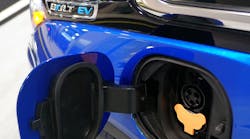General Motors reported that its supplier LG has restarted production for lithium-ion battery modules to be installed Chevrolet Bolt electric vehicles and electric SUVs, and that owners of those recalled vehicles could expect the replacement parts to be available for installation in mid-October.
According to the automaker, it will prioritize replacing batteries in Chevy Bolt EV and EUV customers whose batteries were manufactured during specific build timeframes, where GM believes battery defects were “clustered.”
Affected customers will be notified when replacement modules will be available for their vehicles.
Starting in November 2020, GM began a recall of 2017-2019 Chevy Bolts due to a number of battery fires. In May 2021, GM said it would install new software on those affected models (and all new models) to help prevent future fires. More fires were reported after the new software had been installed.
In August, GM expanded the recall to include 2019, 2020, 2021, and 2022 Bolts and Bolt EUVs.
By that time, GM said it identified the cause of the battery fires as two separate defects: 1) a torn anode and 2) a folded separator, both of which must be present in the same battery cell in order for the fire to take place.
However, in identifying the battery as cause of the fires, GM in August was forced to suspend production for the 2022 Chevrolet Bolt passenger cars and Bolt EUV sport-utility vehicles.
The automaker has not indicated whether assembly of the new Chevy Bolts at the Lake Orion, Mich., plant will resume as initially scheduled on October 11.
New batteries to be provided for the recalled vehicles will include an extended battery warranty, GM stated: 8 years/100,000, or 8 years/160,000 km in Canada.
More than 140,000 Chevy Bolts are covered by the recall, and the automaker said it soon will have available a diagnostic software that allow owners to fully charge the cars unattended. At the present time, full charging has been cautioned against.
“We absolutely have figured out how these defects happened,” according to Tim Grewe, GM’s battery-cell engineering director, “...and that’s what started our (EV battery) production up again.”






